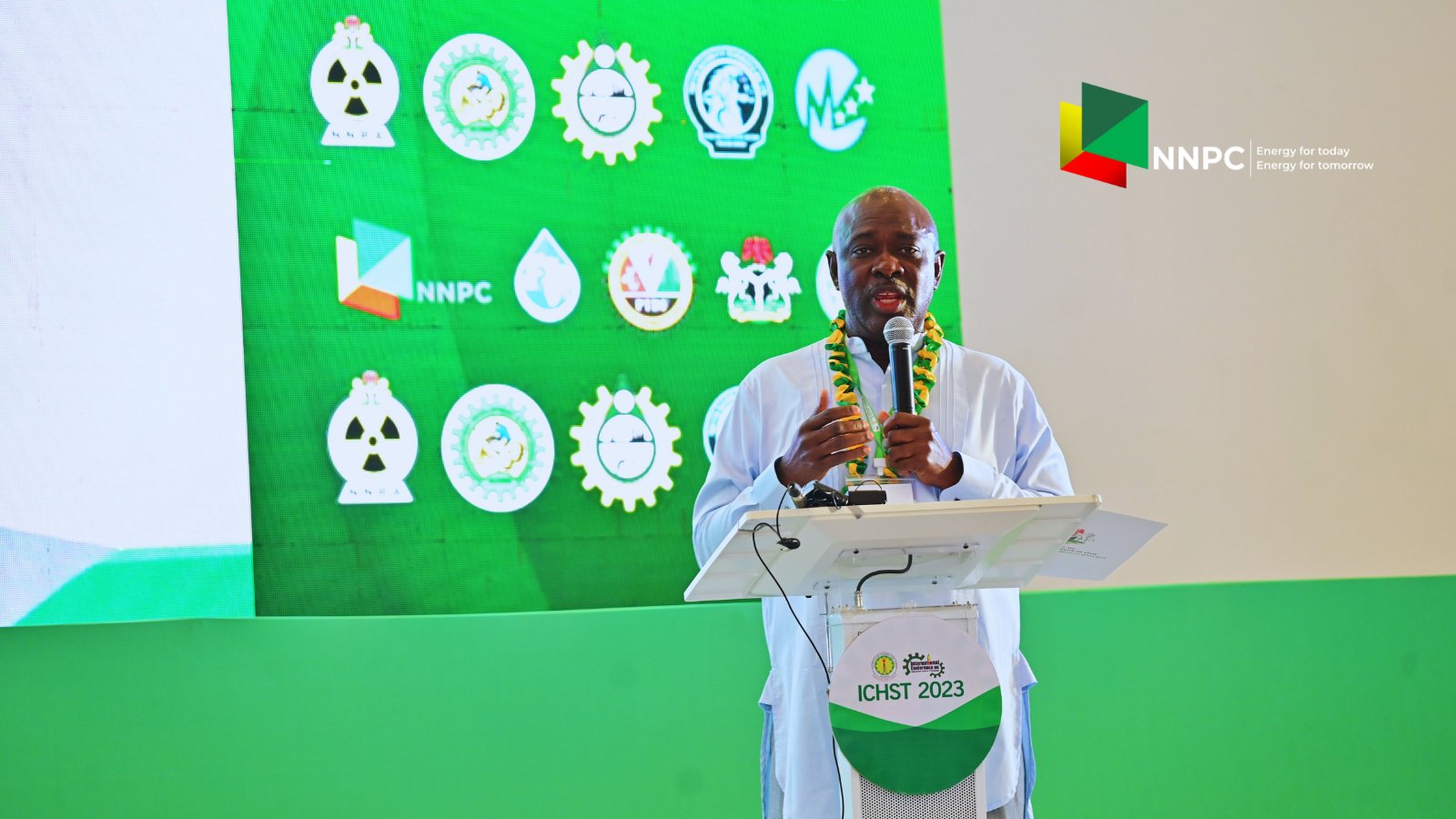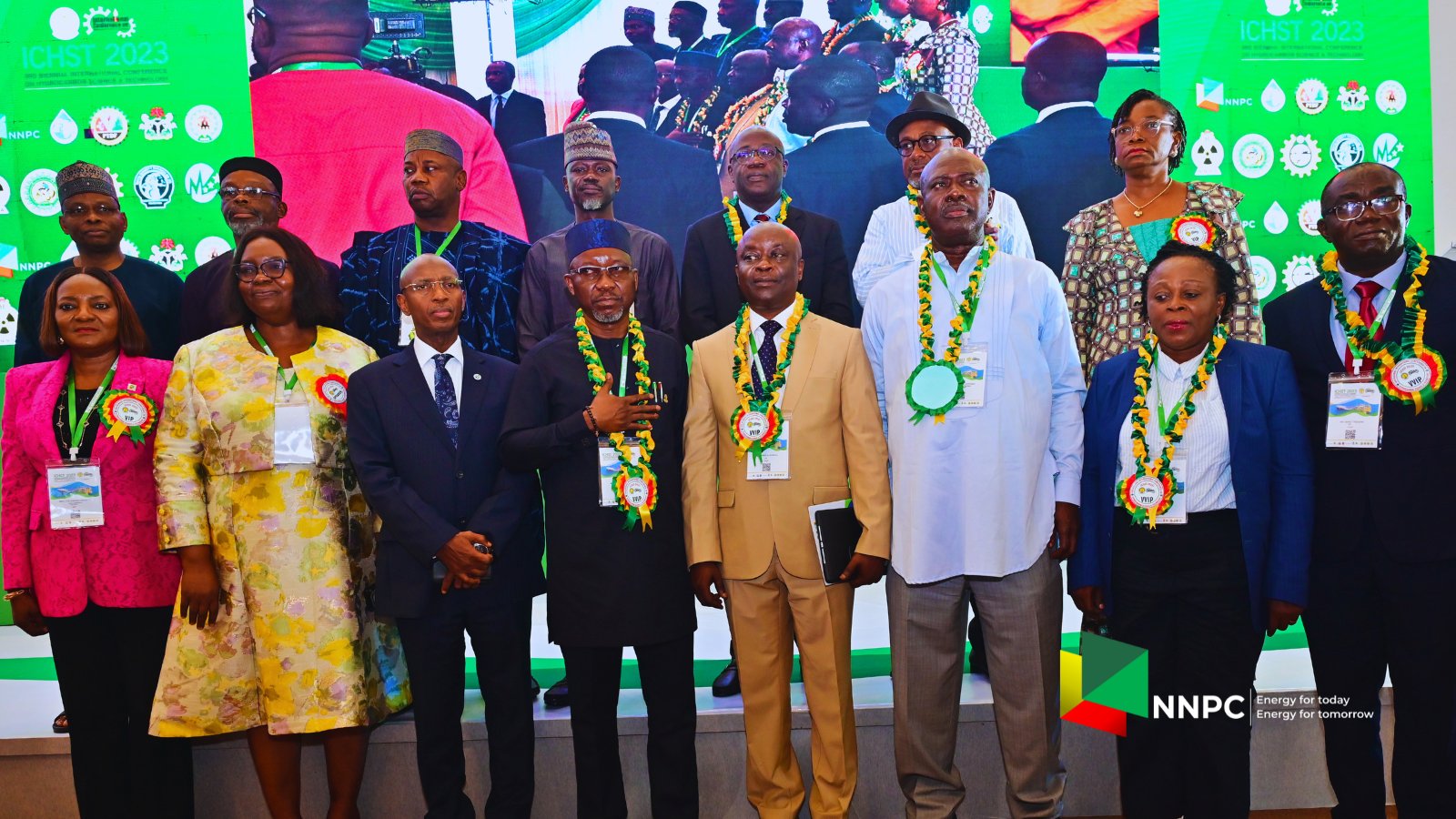Lokpobiri Calls For Stakeholders’ Collaboration To Ramp Up Oil Production

The Minister of State for Petroleum Resources (Oil), Sen. Heineken Lokpobiri has called on industry stakeholders to evolve technology that would address the nation’s local oil production problems.
Sen. Lokpobiri made the call on Monday at the 3rd Biennial International Conference on Hydrocarbon Science and Technology (ICHST) 2023, in Abuja.
With the theme, “The Future of the Oil and Gas Industry: Opportunities, Challenges and Development,” the Minister emphasised the critical importance of addressing the unique challenges facing the oil industry.
“I challenge researchers to target their efforts on solutions tailored to our specific needs, aligning with the Federal Government’s commitment to increase production”, he said.
He pledged the Ministry’s support for the Petroleum Training Institute (PTI), Petroleum Technology Development Find (PTDF), Nigerian National Petroleum Company (NNPC) Limited, Nigerian Upstream Petroleum Regulatory Commission (NUPRC), Nigerian Mainstream and Downstream Regulatory Authority (NMDPRA) and all other partners.
“As a ministry, we will give you all the support that is needed from time to time to enable you to deliver on your mandate so that we can ramp up production. Our sole aim in Nigeria is to see how we can increase production”, he assures.
Lokpobiri said, “the conference wasn’t just about academic discourse; it was a platform to drive innovation, collaboration, and progress in the course of shaping the future of our industry and I commended the organizers, Petroleum Training Institute (PTI) on this initiative”.
Also speaking, the Secretary-General
of the African Petroleum Producers’ Organization (APPO), Dr. Omar Farouk Ibrahim, said, the organizers could not have chosen a more apt theme given Nigeria’s endowment in oil and gas reserves, with about one-third of Africa’s 125 billion barrels of proven oil reserve and also about a third of the continent’s 620 trillion cubic feet of proven gas reserve, the strategic role that the industry plays and shall continue to play in the economic life of the nation, and the imminent challenges that the global energy transition pose to the industry globally but particularly to Africa and its oil and gas endowed and dependent countries.
He noted that “the oil and gas industry has a future in Africa. But that future is contingent on abandoning the traditional ways we have done things since we achieved political independence, where each country takes important economic decisions in isolation of its neighbors, but in consultation with some powers outside the continent.
“For the oil and gas industry to have a future in this era of energy transition, African oil and gas producers need to take cooperation and collaboration more seriously. And I am pleased to note that we are seeing this in APPO”, he said.

On his part, the Executive Secretary, Nigerian Content Development and Monitoring Board(NCDMB), Engr. Simbi Wabote said, with NCDMB’s aspiration of significantly increasing Nigerian Content level to 70% by the year 2027 in line with its 10-year strategic Roadmap, the Nigerian oil and gas industry would continue to witness significant participation of Nigerian manpower in the oil and gas industry.
Engr. Wabote said, the proven crude oil reserve of Nigeria has hovered around 37 billion barrels based on the data made available by NUPRC earlier this year.
He said, the figure was set to increase with the passage of the Petroleum Industry Act (PIA) in the year 2021 as the nation’s crude oil reserve was expected to increase significantly over the next few years and was projected to reach 50 billion barrels.
Wabote said, the nation’s crude oil production has also been experiencing distortions as daily crude production fluctuates, with the daily crude oil production at about 1.3 million barrels per day.
He said, the figure is, however, projected to increase and stabilize over time to around 2 million barrels per day and expected to further increase to about 4 million barrels per day in the very near future.
He disclosed that the indigenous oil and gas companies have proven their mettle as they have now assumed an active role in crude oil production as they are responsible for producing about 15% of the nation’s oil and 60% of its domestic gas.
He said, the push to ramp up in-country refining capacity was legitimate as refining the nation’s crude oil into finished products that will be utilized locally and exported will contribute positively towards the economic growth and development of the nation.
The ES said, “from around 1970s and early 80s when the nation’s refineries were constructed, Nigeria had a combined refining capacity of 445,000 barrels per day.
“However, due to several factors, the nation’s refineries have either not been in operation, or they have operated sub-optimally.
“However, between the year 2010 and now, Nigeria will acquire an additional refining capacity of 980,000 barrels per day which if added to the existing 445,000 barrels per day capacity of the nation’s Kaduna, Warri, and Port Harcourt refineries will translate to a combined approximately 1.5 million barrels per day refining capacity”, he said.
The NCDMB boss said, in 2018, the Board commenced implementation of our 10-year Strategic Roadmap which has an overarching objective of raising the Nigerian Content level in the Oil and Gas industry to 70% by the year 2027.
“It is gladdening to note that we are on course as we have been able to drive the Nigerian Content level to 54% as of the end of the year 2022.
“We are indeed optimistic that we will be able to reach the target of 70% by the year 2027.
“I am convinced that the future is bright for the Nigerian oil and gas industry. We see positive trends in the growth of oil reserves, gas production, gas utilisation, local refining, and skills acquisition which portend great opportunities for the future of the oil and gas industry in Nigeria”, he said.
Earlier in his welcome address, the Executive Secretary of the Petroleum Technology Development Fund (PTDF), Mr. Ahmed Galadima said, the oil and gas sector, especially in Nigeria, is at an intersection of complex challenges and unprecedented opportunities.
Galadima said, the industry grapples with a myriad of issues, from technological hurdles, research limitations, and the dwindling landscape of investments and finance, adding that there is an observable decline in the discovery of new oil and gas reserves, which further underscores the importance of bolstering our research funding and technological development.
However, he said, “in the midst of these challenges, there are glimmers of hope. The imminent commencement of the Dangote oil refinery, the completion of pivotal pipeline infrastructure like the AKK, and the production initiatives at the Komani oil field in Northern Nigeria, present a hopeful panorama of opportunities that can reinvigorate the industry”.
He said, as nations transition towards cleaner energy sources, Nigeria, with an economy deeply rooted in fossil fuels, faces substantial economic and developmental challenges.
He, however, assures that the PTDF, as a pivotal capacity-building arm of the Federal Government, was committed to driving the change, primarily through its established Human Capacity programs.
He said, apart from the Fund’s Scholarship Programme, both Overseas and In-Country schemes, it has pioneered the establishment of two paramount centers of excellence: The College of Petroleum and Energy Studies (CPESK) in Kaduna, and the Centre for Skills Development and Training (CSDT) in Port-Harcourt.
“With these centers nearing full operational capacity, they will serve as the crucibles of knowledge, offering specialized courses across the oil and gas value chain, thus bridging our nation’s training gap in the energy domain”, he assures.
In her remarks, the Director, NNPC Academy, Mrs Folashade Adekeye said, with the passage of the PIA and the need to prepare the workforce in the energy sector, stakeholders, and the public on emerging trends, NNPC Academy was poised to play a leading role in human
capacity development.
She noted that the Academy was in partnership with reputable institutions, organizations, and professional bodies in equipping players within and outside the industry for the eventual challenges ahead, adding that its partnership and collaboration with PTI through ICHST would spur innovation and expansion in the energy sector.






